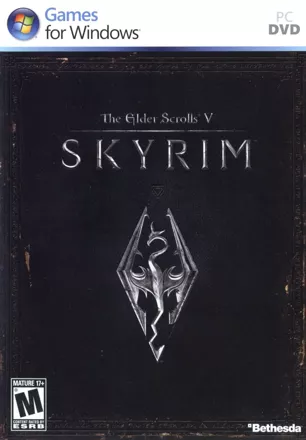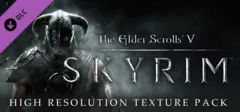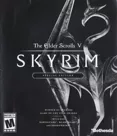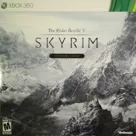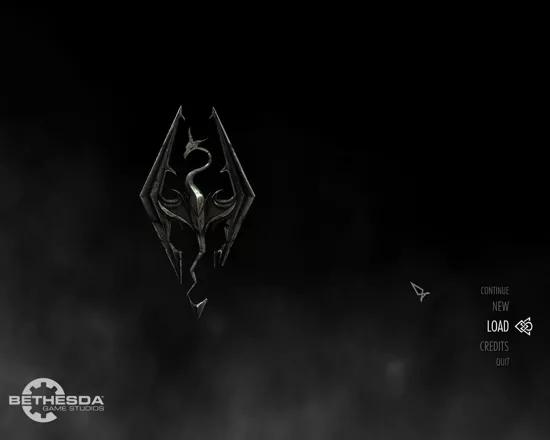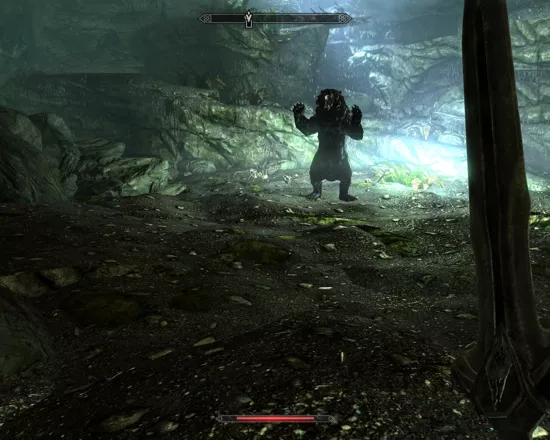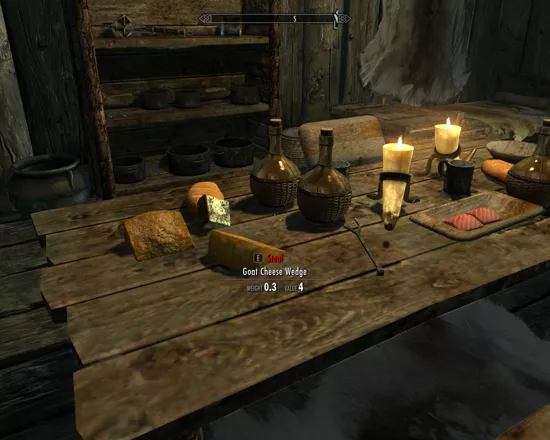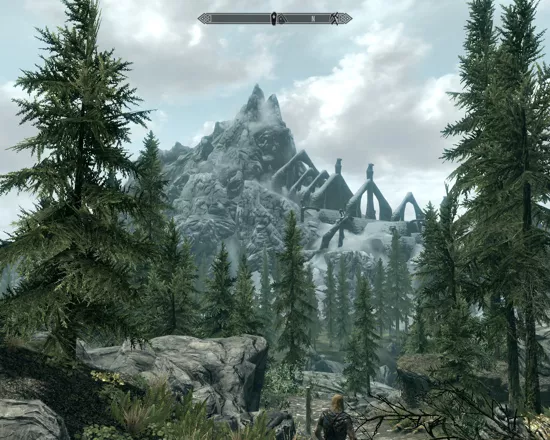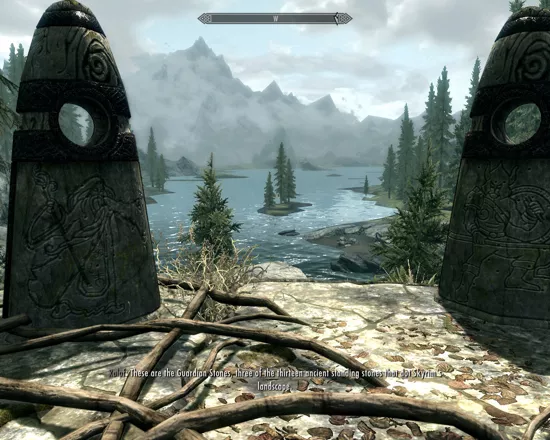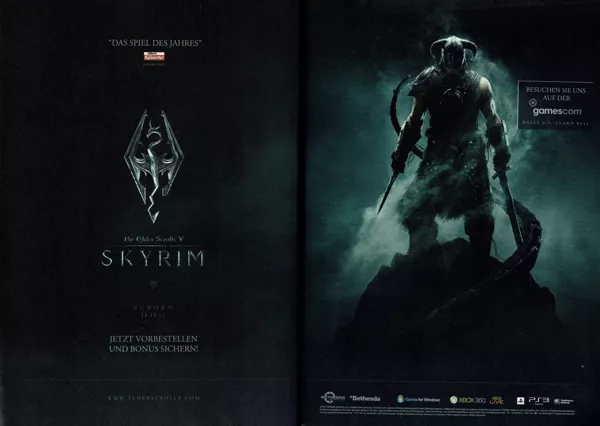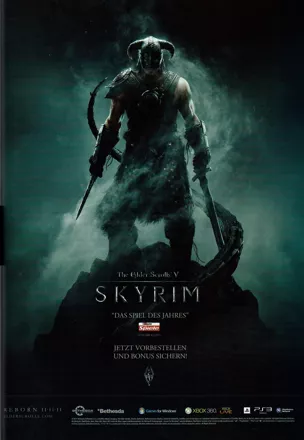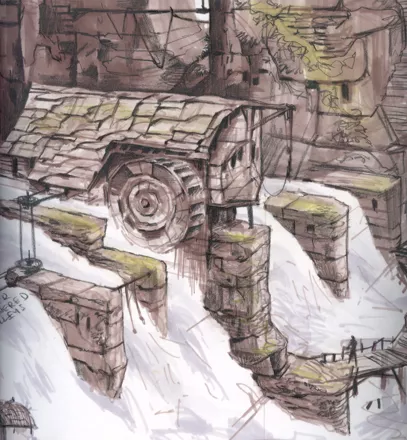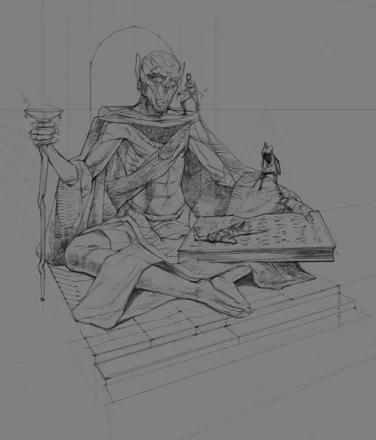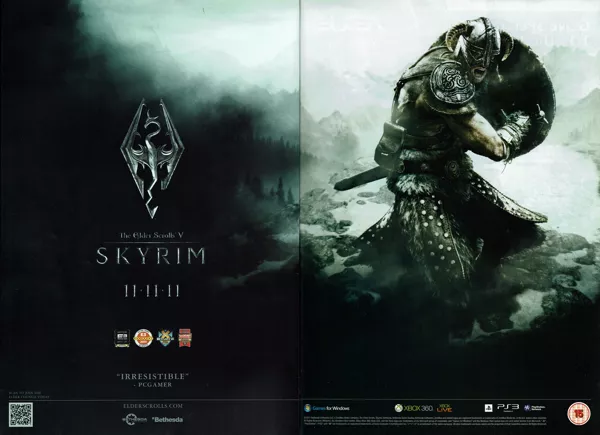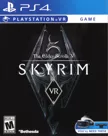The Elder Scrolls V: Skyrim
Description official descriptions
Two hundred years after the events described in Oblivion, the continent of Tamriel is in turmoil. The Emperor's throne remained without heir; the Blades, Empire's elite guards, have been disassembled; elven nations began capturing territory from the Empire. The assassination of the King of Skyrim, Tamriel's Northern-most province and home of the Nord race, led to a civil war between those who wish independence for Skyrim and those who wanted it to remain under the Empire's control.
A prisoner is brought to a small town, awaiting execution for alleged involvement with the Stormcloaks, a group that was founded by the king's assassin Ulfric Stormcloak. Just before the executioner's axe lands on the prisoner's neck, a dragon attacks the city, forcing most people to flee. The unexpected freedom leads the ex-prisoner into the snowy Skyrim, where the rumors of the dragon begin to circulate.
Like its predecessors in the Elder Scrolls series, Skyrim is an open-ended role-playing game with action-based combat. The player may explore the vast environments of Skyrim from either first- (default) or third-person perspective, being unrestricted in his or her travels and free to undertake any side quests in any order, or follow the main quest. It is possible to fast-travel to previously visited locations directly from the world map. The player can also opt to buy (or steal) and ride a horse.
There are ten races to choose from: Altmer (High Elves), Argonian (reptile people), Bosmer (Wood Elves), Breton, Dunmer (Dark Elves), Imperial, Khajiit (cat people), Nord, Orc, and Redguard. Each race has their own perks and limitations, such as Nord being resistant to cold, Khajiit being weak with magic, etc. Unlike the previous games in the series, the player cannot choose a class for the main character; rather, the latter evolves into any class-like combination gradually, according to the play style. When the protagonist reaches a new level, the player may increase his or her Health, Magicka, or Stamina and a new perk may be added to one of the skills. There are eighteen skills altogether, and each skill has several levels and perks which may be obtained. Most perks are only accessible after a certain level has been reached in said perk. For instance, in order to reach higher perks with Destruction, destructive spells must be leveled up. Skill levels can increase either through extensive use, skill books, or even paying for training from certain non-playable characters.
The game contains some features that were introduced in Fallout 3. Enemy level-scaling is done in a similar way, as opposed to the more intrusive system of Oblivion. The player may hire other fighters to follow the hero around and lend a helping hand in combat. Also, the lockpicking system of the previous installment has been replaced by the lockpicking methods of the recent Fallout games. Conversations with NPCs now occur in real time rather than "freezing" time as in Oblivion.
Players can craft, cook, or build any number of items depending on ingredients and skill levels. Alchemy allows players to make potions, Enchanting allows players to imbue armor and items with magical abilities (such as increasing the effectiveness of magic resistance), and Smithing allows players to either craft or improve weapons and armor. Smelting, tanning and cooking are also a part of this mix as well: Smelting is the skill of turning raw mined mineral ores into usable ingots for smithing; Tanning is the process of drying animal hides to make leather strips, useful in creating or improving armor and weapons; Cooking allows players to turn otherwise minimally useful food ingredients into much more beneficial meals.
Melee attacks can be performed using either two or one-handed weapons. Blocking reduces damage and allows for the opportunity to bash an opponent with a shield. Archery is also available for some ranged attacks, as is quite a bit of magicka. Each race also has a distinct magic-like power ability; only one power may be equipped at a time. For instance, a Nord power is to frighten enemies away for a while. New to the series is the Shout ability, which is a special power based on Dragon language. These require a special set of circumstances to unlock: first, the ancient words must be learned from Word Walls hidden all over Skyrim; secondly, they can only be activated by acquiring a dragon soul (from slaying a dragon).
Crimes may be committed by stealing, pickpocketing, murder or attacking innocent people, or even by trespassing. Generally this puts a bounty on the head of the player character, unless said character is quick enough to eliminate all witnesses. Fines and jail time, or a beat-down from authorities, are likely to ensue if the hero commits too many crimes or merely ends up getting caught. The protagonist can serve out his or her sentence on the jail bed, or pick the lock and escape; however, going to jail is likely to cause current skill progress to be lost.
As before, there are several groups, guilds, and the like that the player may encounter and join, each with their own advantages or disadvantages, each with their own views on the current events of the world, and each with their own quests. The abilities to become a werewolf or vampire are also present and have been somewhat streamlined: for instance, sunlight is not instantly deadly to vampires, and lycanthropy can be spread around.
Groups +
- 3D Engine: Creation Engine
- Animals: Cats
- Elder Scrolls series
- Fantasy Creatures: Dragons
- Fantasy Creatures: Elves
- Fantasy Creatures: Goblins
- Fantasy Creatures: Orcs
- Fantasy Creatures: Trolls
- Gameplay feature: Alchemy
- Gameplay feature: Auto-mapping
- Gameplay feature: Blacksmithing
- Gameplay feature: Cannibalism
- Gameplay feature: Character development - Repetition
- Gameplay feature: Character development - Skill distribution
- Gameplay feature: Drowning
- Gameplay feature: Equipment quick slots
- Gameplay feature: Goldsmithing
- Gameplay feature: Horse riding
- Gameplay feature: House ownership
- Gameplay feature: Hunting
- Gameplay feature: Interior decorating
- Gameplay feature: Lock picking
- Gameplay feature: Mining
- Gameplay feature: Pickpocketing
- Gameplay feature: Survival cooking
- Gameplay feature: Transformation
- Games for Windows releases
- Games with nobility titles
- Green Pepper releases
- Middleware: Bink Video
- Middleware: FaceFX
- Middleware: Scaleform GFx SDK
- Physical Bonus Content: World Map
- Physics Engine: Havok
- PlayStation 3 Greatest Hits releases
- Protagonist: Visually customizable character
- Software Pyramide releases
- Technology: FaceGen
- Video games turned into board / card games
- Xbox 360 Classics releases
Screenshots
Promos
Videos
See any errors or missing info for this game?
You can submit a correction, contribute trivia, add to a game group, add a related site or alternate title.
Credits (Windows version)
810 People (782 developers, 28 thanks) · View all
| Game Design |
|
| Game Director | |
| Lead Programmer | |
| Lead Artist | |
| Lead Designer | |
| Co-Lead Designer | |
| Production Director | |
| Lead Producer | |
| Audio Director | |
| Senior Producers | |
| Producers | |
| Lead Systems Programmer | |
| Systems Programming | |
| [ full credits ] | |
Reviews
Critics
Average score: 91% (based on 73 ratings)
Players
Average score: 3.9 out of 5 (based on 184 ratings with 8 reviews)
I used to like Elder Scrolls, but then I took an arrow to the knee
The Good
It is big and pretty. After the nauseating mess that was Oblivion, I enjoyed playing Skyrim much more than I expected to. In fact, looking back, I wish I had played a bit slower, and taken more time to appreciate the details. I will definitely replay it in a couple of months when mods start shaping up and certain bugs are fixed.
The Bad
The world is generic. Trees, wood houses, stone ruins, bears, cats, foxes, mammoths, giants, skeletons, dragons, ... where have I seen this before? Oh yeah. Everywhere.
The main quest is poorly designed. If you happened to live in a cave during the Skyrim media promotion, then don't worry. Everything is revealed in the first ten minutes: Alduin, the eater of worlds, has awoken again, and you are the dragonborn destined to defeat him! Still, unlike the guild quests, the main quest is relatively okay.
Guild quests are very poorly designed. Everything is Epic and Extreme! Day 1 in the mage's guild: five minute lecture on how to cast spells. Day 2: I'm crawling through a dungeon killing epic undead left and right and discovering epic artifacts. Epic! Day 5: I became the chosen one for an ancient order of super wizards, saved the world and became the arch-mage, even though my skill and knowledge of magic is far less than anyone else's in the guild. Extreme! This is probably the best guild quest in the game too, the others are far worse. The Stormcloak/Empire quests aren't even funny, they're just plain bad.
After you achieve something great, nothing in the game changes. Defeated Alduin? Dragons are still flying around just like before. Defeated the Stormcloaks? There are still respawning Stormcloak outposts just like before. I guess in Morrowind it made sense because it was all hush-hush. You could boasts about your deeds but nobody would believe you. In Skyrim everyone seems to be perfectly informed about everything. Guards will randomly tell you that they know you are in the Dark Brotherhood for example. Or that you're a conjurer, or that you are good at lockpicking. They even comment about artifacts you have equipped. It's incredibly incoherent too. You can kill a dragon and absorb its soul in front of a guard and he'll still say "I got to thinking, maybe I'm the dragonborn and I just don't know it yet". No, bro. I'm the dragonborn, as you damn well know.
It's like Bethesda put no thought into the logic of the world at all. They just made content for content's sake.
Finally, the gameplay itself feels better, it has lost something. It's become far too easy and monotonous. In Morrowind, mages had to invest some thought into what they would cast because magicka didn't just regenerate in a couple of seconds, and the spell selection was bigger. In Skyrim you can let loose everything you've got in every encounter. This is just one example out of many of how the gameplay was dumbed down.
The Bottom Line
It's Fallout 3 with swo... I mean, it's a new TES game.
It's much better than Oblivion, but lacks the artfulness, consistency and weirdness of Morrowind.
However if Bethesda improves in the next game as much as they have improved from Oblivion to Skyrim, then perhaps there is hope yet.
Windows · by dorian grey (243) · 2011
The Good
My feelings for Elder Scrolls games changed from complete indifference to annoyance and finally admiration. Over the course of my game-playing career I've come to appreciate and enjoy all of its installments, from Arena to Oblivion. I eagerly anticipated Skyrim and was eventually rewarded with a game that, while not exactly re-inventing the formula, polishes and embellishes it to the utmost degree.
Skyrim has everything we love in Bethesda's RPGs - above all, of course, a huge, engrossing open world full of things to try out. I won't go into detail here; anyone familiar with the company's previous works will instantly recall the addictiveness of nearly unlimited exploration and the joy of methodically developing a character in a free-form way. Skyrim keeps everything intact: it is one gigantic, delicious chunk of gaming to entertain us for hours upon hours.
In this review I'll concentrate of what Skyrim does better than its predecessors. In two words, that would be "almost everything". Indeed, Skyrim is a clear example of developers actually listening to fans and working to improve and rectify whatever was wrong in their previous games. So much of the criticism leveled against Morrowind and Oblivion has been addressed that many of these predecessors' most aggravating issues disappeared almost fully.
Elder Scrolls games were gradually getting better at concealing the randomness of their enormous worlds, the artificial way they were constructed, the lack of personality in places and people. Skyrim feels much more "seamless", more homogeneous than Bethesda's previous games. Everything is designed with greater care, and it really shows. The NPCs are by far more life-like, more natural; locations ooze poetic atmosphere; the detail is overwhelming. It is hard to define this volatile sensation, but Skyrim does away with unpleasant stiffness that plagued all its predecessors. Its world may be covered by snow and ice, but it is much warmer.
Earlier games in the series had problems with dungeon design. Skyrim offers atmospheric, interesting dungeons which are a pleasure to explore. Long and reasonably complex (without the excesses of Daggerfall), they are rewarding and fairly unique in style. Many of them have puzzles and other clear distinguishing features, and some are very impressive in design and scope. Comparing them to the monotonous copy-pasted caves of Dragon Age II, we see that Bethesda beats the competitors at their own game.
The radiant AI of the NPCs works better than in Oblivion, and everyone seem to behave more naturally in general. A lot of effort has been put into personalizing NPC lines and updating them as the game evolves. One time I chatted with a nameless guard in a quiet town and he first commented upon recent political changes and then expressed his solidarity with my decision to use one-handed weapons. In short, the conversation felt more like a verbal exchange between two normal people than a few random lines rigidly stuck into a video game to fill space. This is just an example of how the developers of Skyrim paid attention to detail.
Combat system is, in essence, the same as in the previous game, but battles are more visceral and exciting. Combat just feels right, and is enjoyable throughout. One of the best things Skyrim does is fix the terrible level-scaling system of Oblivion. Some of the enemies still scale with you, but overall the effect is by far less noticeable. There is a sense of danger when an underleveled character encounters a stronger foe, and a sense of accomplishment when preparation and tactics lead to victory. The new skill trees are interesting and do not in the least interfere with the old system. On the contrary, they add another layer of depth and complement skill development very nicely. Leveling up is faster, clearer, more logical and less confusing than in any previous Elder Scrolls game. Archery and magic have clear advantages even when fighting regular enemies, and there is a good incentive to explore different development venues. Everything is better balanced and challenging in a good way.
The game's story is decidedly better than in Oblivion and has quite a few memorable moments. The main quests are interesting and take you to spectacular locations. Some of the scenes are genuinely thrilling; the first battle against the dragon, for example, masterfully conveys the feelings of awe and fear. Dragon battles in general are fascinating, and belong to the most exciting RPG confrontations in recent memory. Besides dragons, there is plenty of interesting wildlife; all kinds of creatures, from deer to mammoths, roam the countryside, and you'll fight ferocious bears and fearsome sabre cats. The game world breathes life; it has its own culture and traditions that are interesting to learn. Fortunately, they have removed the instant fast-travel from the previous game: in order to discover a new location, you actually have to manually venture there, enjoying the beautiful, yet often perilous journey.
The Bad
All that said, I'd like to stress that Skyrim still is, for all purposes, a typical Bethesda game and has inherited some of the series' cardinal weaknesses. Though I love both games, Fallout: New Vegas was, in my opinion, a more impressive merging of open-ended RPG with memorable characters and setting. Writing in Skyrim (with the exception of Daggefall-age books) is more or less on par with Fallout 3; characters are a bit more interesting. But overall, there is still a certain lack of liveliness in character presentation and stale, formulaic conversations that have become associated with Bethesda's RPGs. There can be no comparison between the narrative quality of Skyrim and the brilliance of the writing in BioWare's and Obsidian's games. Skyrim is certainly an evolution, but not a revolution.
There are companions in Skyrim, but they are painfully silent. My faithful follower Lydia made nearly no comments and reacted indifferently to whatever happened around her. I hope that next time Bethesda will put more thought into dialogue with companions. It is one of the last barriers that they have to jump over in order to triumph over their colleagues in RPG-making.
The graphics of Skyrim worked for me, but didn't quite evoke the same sense of wonder as Morrowind and Oblivion had done in their time. Character graphics are quite unremarkable. Towns, dungeons and outdoor locations are clearly crafted with heart, but the occasional coarse texture may spoil the enjoyment. The homogeneous world is detailed, but the bleak northern landscape can get repetitive and rather depressing.
I only have minor complaints about the gameplay. I didn't like the lockpicking system and would prefer the mini-game from Oblivion instead. I missed the acrobatics skill; pity they don't let us perform crazy leaps by practicing jumping any more. And the interface is, as you might have heard, weird and uncomfortable. Eventually I got used to it, and I must say that large graphical items are a step forwards compared to the boring icons from the previous game; but irrational key bindings nearly drove me mad until I installed a patch.
The Bottom Line
While New Vegas still holds the crown of modern RPG development in my eyes, Skyrim comes very close. Like earlier Bethesda products, it lacks the wit and the charm of BioWare's and Obsidian's works; but it steadily improves upon its predecessors and offers the most complete and convincingly crafted classic Bethesda experience so far.
Windows · by Unicorn Lynx (181798) · 2012
Bethesda's very first masterpiece
The Good
This is it. Bethesda had finally done their homework by listening to their fans, researching into what worked and not thus far in this most complicated genre of all, what made Morrowind so much deeper and more memorable than Oblivion -- and they released what is probably their best and most consistent game yet. All things considered, it is also among the best role-playing games ever made. But Bethesda needed all their blood, sweat and tears, all the hard experience from Arena to Fallout 3 to pull this feat.
Skyrim is best described as a distinctive, homogeneous experience in a dynamic open world. I think it is best played in huge chunks, in a wide-eyed, semi-meditative state, which is a prerogative of open-world RPG's, this pinnacle genre in video gaming. I'll try to break down the best components of this experience:
-
As much as the vast open-world formula permits it, Bethesda creates free-roaming NPC's with true characters -- even if only some of them really stick out and even fewer are memorable. As expected, characters who are relevant to the main plot are fleshed out the most: Ulfric Stormcloak, his second-in-command Galmar, Esbern, and our clandestine associate Delphine, perhaps most of all. What is great though is that some of the less important characters end up being quite memorable too: Ancano, the mysterious Thalmor emissary in the College. Madanach, the disgruntled leader of the Forsworn. Kodlak Whitemane, the Companions' elderly foreman who even writes a lengthy diary that we can discover. And when I finally lost my loyal sidekick Lydia in some dungeon after days of doing quests together, I felt a genuine sense of emotional loss (even if she wasn't one of the more memorable NPC's), a very rare feeling in computer games.
-
Politics are realistic, complex, convoluted, frustrating, as they should be. The internal and external struggles of the various factions are not sugarcoated for the player, it's all laid out as it is, and we need to figure our own way around the relations. The Empire, the Thalmor, the Stormcloaks, the Forsworn, the Blades, the Greybeards -- all their destinies are intertwined in a realistic way, all have their respective agendas that the player needs to figure out with minimal to no hand-holding. The fact that Skyrim's political landscape is not simplified for easier digestion is one of my favorite aspects of the game. It's a subtle, mature feature not advertised with hype, yet it helps the immersion tremendously.
-
Many of the conversations are deep and involving -- for a Bethesda game. They are excellently written and are often quite long, which is taken for granted from some other developers like Obsidian, but it's a very pleasant surprise coming from this developer who were once notorious for their drone-like NPC's and deadpan dialogues. The crucial negotiation scene in High Hrothgar reminded me of the Castle Never trial scene in NWN2, as it achieved the same kind of tension, gravity and drama, which is awesome for a mostly non-scripted open-world role-playing game. Skyrim is probably the very first open-world RPG that lives up to the challenge posed by Obsidian's offerings in terms of dramatization and tension.
-
Many of the quests are creative, exhilarating and unorthodox. The main plot line is haunted by a sense of wonder and is graced by many (scripted) scenes that are bound to be remembered as some of the most memorable scenes in gaming: the first dragon hunt at the Whiterun guard tower; the reading of the Elder Scroll on the mountaintop; the dragon trapping in Dragonreach; the greeting and cheering of a dozen flying dragons after the final battle. And Blackreach, a vast, eerie, otherworldly cavern with abandoned structures is one of the top five ingame locations I have encountered in a game EVER. Outside of actual real-life adventure travel, it is probably only open-world RPG's that are capable of achieving this sense of wonder, since it presupposes the element of boundless exploration in an intriguing region. It also presupposes a capability of sensing wonders in the players themselves, something that many jaded gamers of today seem incapable of -- in real life or virtual.
-
There are about 330 books in Skyrim, and while I haven't read all of them, I took the time to read quite a few. This is part of why the game is a triumph: not one of the books is shallow, boring or badly written. Yes, I know that many were already included in earlier Bethesda games, and most of them are brief 3-4 page treatises. Yet all things considered, this has to be one of the first games that does take its own book reading feature very seriously. You can spend several hours just browsing through the ingame books and not be bored. What's even better is the way the books' material ties in directly with the actual gameplay. In most RPG's, ingame books are disconnected from the actual gameplay. Here, they complement it. You can read a lot about Alduin or the Wolf Queen, for instance, and later you get to meet both of them.
-
Some towns are architecturally awesome and feel alive with daily bustle. Markarth and Whiterun, especially. I liked the vibe of Solitude and Riften as well. Again, this would not be such a feat in a "hands-off", closed-world RPG, but the fact that even towns are awesome and realistic in Skyrim makes the end product all the more irresistible.
So the game is not only huge and open-ended, but it includes characters, quests, books and towns with the high quality of smaller scale closed-world games: it's a culmination of the best of both worlds, not unified successfully until now.
The Bad
I finally got fed up with all of it around the 100 hours mark. That's quite a feat as the vast majority of contemporary RPG's stop being interesting (and usually run out of material) before 40-50 hours of gameplay. At this point, I couldn't stand to endure another bandit-infested fort, another Nord village, another steampunk Dwemer ruin, another mission update and so forth. It was too much, because Skyrim's world is very homogeneous. You'll find the exact same non-scripted stuff at the southern tip as on the icy northern reaches. Thus Skyrim's geographic and thematic realism is a mixed blessing; it can get grating, repetitive, predictable. But it's a long enjoyable ride until that point.
The skill system is radically simplified and streamlined, clearly the influence of mainstream console gaming (which itself is a blight on role-playing games). Much had been said about the classless system and the lack of skills like acrobatics. While all this can be interpreted as a dumbing down of game mechanics, I found that it doesn't hinder immersion, in fact maybe it promotes it: much like on a real-life adventure trip, in Skyrim all you need to really worry about is the actual surrounding environment instead of stats and dice rolls.
The Skyrim province and culture is quite blatantly inspired by Medieval Scandinavia, right down to the names and the looks of the people. I wish Bethesda took a more original approach than just "vikings on steroids".
I've used the already-famous SkyUI mod almost from day one, because I found the original UI insufferably dumbed-down and console-y. Its inventory management was so simplistic and awkward, it felt like it belongs to a lesser game.
Oh, the bugs. The 1.4 patch (as of early 2012) still failed to squash a number of serious show-stoppers. But us open-world RPG fans learned years ago that a major game is considered an "immature" release until it lives to see its first or even second birthday. By then the inevitable barrage of official and unofficial patches will have probably helped it to thoroughly playable status. (VTM: Bloodlines and Gothic 3 are prime examples of why it is useful to wait at least 2 years after initial release.) Judging by that, I'm sure I'll return to Skyrim around 2014 for another playthrough.
The Bottom Line
"We’re checking [Skyrim] out aggressively. We like it. We’re big admirers of [Bethesda] and the product. We think we can do some wonderful things," says Bioware co-founder Ray Muzyka. That has to be the ultimate praise, even if it comes from an increasingly uninspired developer that has spent the last few years spiraling down from failure (Mass Effect 2) to failure (Dragon Age 2) to sellout (The Old Republic). Here's hoping that Skyrim will change the development path of RPG's for the rest of the decade, bringing back both Obsidian and Bioware to the right track.
Let's face it: Skyrim is an important moment in game history. Its success and greatness prove to the entire industry that hardcore, epic games are not only actually marketable, they are plain cooler than anything the more casual Wii/PS3 market can come up with. They are even capable of entering popular culture if the quality and marketing is right. This is going to be a great decade for hardcore role-playing game fans.
Windows · by András Gregorik (59) · 2013
Discussion
| Subject | By | Date |
|---|---|---|
| New animations | Indra was here (20771) | Feb 11th, 2013 |
| Some thoughts about Skyrim | The Fabulous King (1332) | Jan 23rd, 2012 |
| Low sound? | Unicorn Lynx (181798) | Dec 20th, 2011 |
Trivia
Awards
- 4Players
- 2011 – Best Game of the Year (Readers' Vote)
- GameSpy
- 2011 - Game of the Year
- 2011 – RPG of the Year
- GameStar/GamePro (Germany)
- 2011 - PC Game of the Year (Readers' Vote)
- 2011 - Console Game of the Year (Readers' Vote)
- 2011 - PC RPG of the Year (Readers' Vote)
- 2011 - Console RPG of the Year (Readers' Vote)
- 2013 – Community Favourite of the Year (Readers' Vote)* PC Games (Germany)
- Issue 01/2012 - Best Game in 2011 (Editors' Choice, together with Batman: Arkham City and Portal 2)
- Issue 01/2012 - #2 Best RPG in 2011 (Readers' Choice)
- Issue 01/2012 - #2 Best Game in 2011 (Readers' Choice)
- Issue 01/2012 - #3 Surprise in 2011 (Readers' Choice)
- Issue 01/2012 - #2 Best Graphics in 2011 (Readers' Choice)
- Issue 01/2012 - #2 Best Sound in 2011 (Readers' Choice)
- Issue 01/2012 - #2 Best Sound in 2011 (Readers' Choice)
- Steam Awards
- 2016 — The 'Test of Time' Award — Won
- Xbox 360 Achievements
- 2011 - Game of the Year
- 2011 - Best Original Score
Analytics
Related Sites +
-
FAQs, Walkthroughs and Guides for Skyrim
from GameFAQs.com -
Skyrim - The Elder Scrolls Wiki
The Skyrim wiki website on wikia.com -
Skyrim Walkthrough
includes news, guides, quest information, mods -
The Elder Scrolls V: Skyrim Hints from UHS - Not Your Ordinary Walkthrough
includes tips & tricks, strategies and guides for the game -
Week of Madness
A gimmick diary with a Skyrim packed full with mods. Written by Richard Cobbett on PC Gamer (Part 1/5) -
Wikipedia: The Elder Scrolls V: Skyrim
Article about the game in the open encyclopedia
Identifiers +
Contribute
Are you familiar with this game? Help document and preserve this entry in video game history! If your contribution is approved, you will earn points and be credited as a contributor.
Contributors to this Entry
Game added by ResidentHazard.
Additional contributors: Jeanne, Havoc Crow, Yearman, Patrick Bregger, Kennyannydenny.
Game added November 16th, 2011. Last modified January 19th, 2024.
